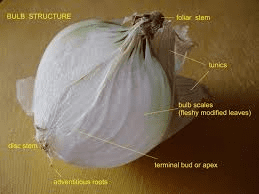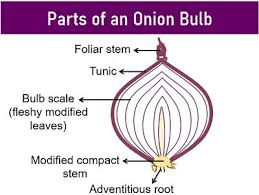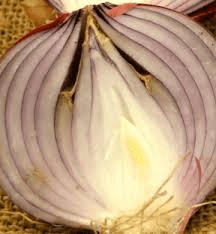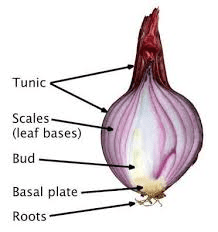Onion scales, also known as onion layers, are the distinct concentric rings found inside an onion bulb. These scales are modified leaves and are crucial to the onion’s structure and function.
The onion bulb is made up of several layers or scales, each forming a protective layer around the central core. The scales are arranged in a radial pattern, with the youngest layers at the center and the older layers towards the outside. This arrangement helps the onion grow uniformly and store nutrients efficiently.
Each scale consists of two main parts: the outer epidermis and the inner mesophyll. The outer epidermis is a layer of tightly packed cells that provides protection and structural support. This layer is covered with a cuticle, a waxy coating that helps reduce water loss. The mesophyll, on the other hand, is composed of parenchyma cells with numerous air spaces. These cells store water and carbohydrates, which are essential for the onion’s growth and energy reserves.
Onion scales are also involved in the plant’s defense mechanisms. They contain sulfur compounds that give onions their distinctive smell and taste. These compounds, such as sulfoxides and thiopropanal-S-oxide, are released when the onion is cut or damaged. They can irritate the eyes and respiratory system of animals, acting as a deterrent against herbivores.
The scales also play a role in the onion’s reproduction. During the flowering stage, the nutrients stored in the scales support the development of the flower stalk and seeds. After the seeds are produced, the onion bulb can either be harvested or left in the ground to produce new shoots.
In cooking, onion scales are valued for their flavor and versatility. They can be used raw in salads, cooked in soups and stews, or caramelized to enhance their natural sweetness. Additionally, onions are known for their health benefits, including anti-inflammatory and antioxidant properties.
Onion scales are essential components of the onion bulb. They provide protection, store nutrients, and play a role in the plant’s defense and reproduction. Understanding these scales helps us appreciate the complex biology of onions and their significance in both culinary and medicinal contexts.
The Economic Importance and Uses of Onion Scales

1. Composting Material: Onion scales, the thin, papery layers that cover the bulb, are excellent for composting. They add valuable organic matter and nutrients to compost piles, enhancing soil health.
2. Natural Mulch: Onion scales can be used as mulch in gardens. They help retain soil moisture, suppress weeds, and improve soil fertility as they decompose.
3. Biodegradable Packaging: Research is exploring the use of onion scales in biodegradable packaging materials. They offer an eco-friendly alternative to plastic packaging.
4. Animal Bedding: Shredded onion scales are used as bedding material for livestock. They provide a dry, absorbent layer that helps manage waste and control odors.
5. Natural Pesticide: Onion scales contain natural compounds that can repel pests. They are used as a natural pesticide or pest deterrent in gardens and agricultural settings.
6. Craft Materials: Onion scales are used in craft projects, such as creating textured art and handmade paper. Their natural texture and color are valued in various artistic applications.
7. Bioactive Extracts: The outer layers of onions, including scales, contain bioactive compounds that are researched for their health benefits. These compounds are extracted for use in dietary supplements and natural remedies.
8. Soil Amendment: Onion scales can be used to improve soil structure and increase organic matter content. They are added to soil to boost its fertility and enhance plant growth.
9. Natural Dye: The pigments in onion scales can be used to create natural dyes for textiles and other materials. The dyes produce colors ranging from yellow to brown.
10. Mushroom Cultivation: Onion scales can be used as a substrate or supplement in mushroom cultivation, providing nutrients that support mushroom growth.
11. Water Filtration: Research indicates that onion scales may help in water filtration processes, removing impurities and contaminants from water.
12. Fertilizer Production: Onion scales are processed into organic fertilizers, providing essential nutrients for plant growth.
13. Compost Tea: Onion scales can be used to make compost tea, a liquid fertilizer that provides nutrients to plants and improves soil health.
14. Odor Control: Onion scales can be used in odor control products, such as air fresheners and deodorizers, due to their natural scent-absorbing properties.
15. Food Preservative: The natural compounds in onion scales are being studied for their potential as natural food preservatives, helping extend the shelf life of food products.
16. Eco-friendly Crafts: Onion scales are incorporated into eco-friendly craft products, such as biodegradable confetti and gift wrapping materials.
17. Animal Feed Supplement: Processed onion scales can be included in animal feed to provide additional nutrients and dietary fiber.
18. Traditional Remedies: Onion scales are used in some traditional remedies for their perceived health benefits, including digestive and respiratory health.
Read Also: Cassava Branches: Economic Importance, Uses and By-Products
The Products and By-products That Can Be Derived From Onion Scales

1. Compost: Onion scales are added to compost piles to improve soil health and fertility.
2. Mulch: Used as mulch in gardens to retain moisture and suppress weeds.
3. Biodegradable Packaging: Processed into eco-friendly packaging materials.
4. Animal Bedding: Shredded onion scales used as bedding material for livestock.
5. Natural Pesticides: Used in gardens to repel pests and protect crops.
6. Craft Materials: Incorporated into art projects and handmade paper for texture and color.
7. Bioactive Extracts: Extracts used in dietary supplements and natural remedies.
8. Soil Amendments: Added to soil to increase organic matter and improve fertility.
9. Natural Dyes: Pigments extracted for dyeing textiles and other materials.
10. Mushroom Substrate: Used as a nutrient source in mushroom cultivation.
11. Water Filtration Media: Applied in water filtration processes to remove impurities.
12. Organic Fertilizers: Processed into fertilizers for enhancing plant growth.
13. Compost Tea: Made into liquid fertilizers for providing nutrients to plants.
14. Odor Control Products: Used in air fresheners and deodorizers for natural odor absorption.
15. Food Preservatives: Studied for potential use in extending the shelf life of food products.
16. Eco-friendly Crafts: Used in crafting biodegradable confetti and gift wrapping.
17. Animal Feed Supplements: Added to animal feed to enhance nutritional content.
18. Traditional Remedies: Used in traditional health remedies for digestive and respiratory support.
Read Also: 23 Medicinal Health Benefits Of Aster Tataricus (Tatarian aster)
Frequently Asked Questions (FAQ’s) About Onion Scales

1. What are onion scales? Onion scales are the thin, papery layers that cover the outer part of the onion bulb.
2. Can onion scales be used in gardening? Yes, they are used as compost, mulch, and soil amendments to enhance soil health and fertility.
3. Are onion scales useful in crafting? Yes, they are used in various craft projects, including creating handmade paper and textured art.
4. How can onion scales be used in animal care? They are used as bedding material for livestock and as a supplement in animal feed.
5. Can onion scales be used for natural pest control? Yes, they contain compounds that can repel pests and protect crops.
6. Are onion scales used in packaging materials? Research is exploring their use in biodegradable packaging as an eco-friendly alternative to plastics.
7. What are the benefits of onion scale extracts? Extracts contain bioactive compounds that may offer health benefits, such as antioxidant and anti-inflammatory properties.
8. Can onion scales be used in water filtration? Yes, they have potential uses in removing impurities and contaminants from water.
9. How are onion scales used in food preservation? The natural compounds in onion scales are being studied for their potential as natural food preservatives.
10. Are there any traditional uses for onion scales? Yes, they are used in some traditional remedies for digestive and respiratory health.
Read Also: Waste Management Laws and Regulations: Keeping Our World Clean

